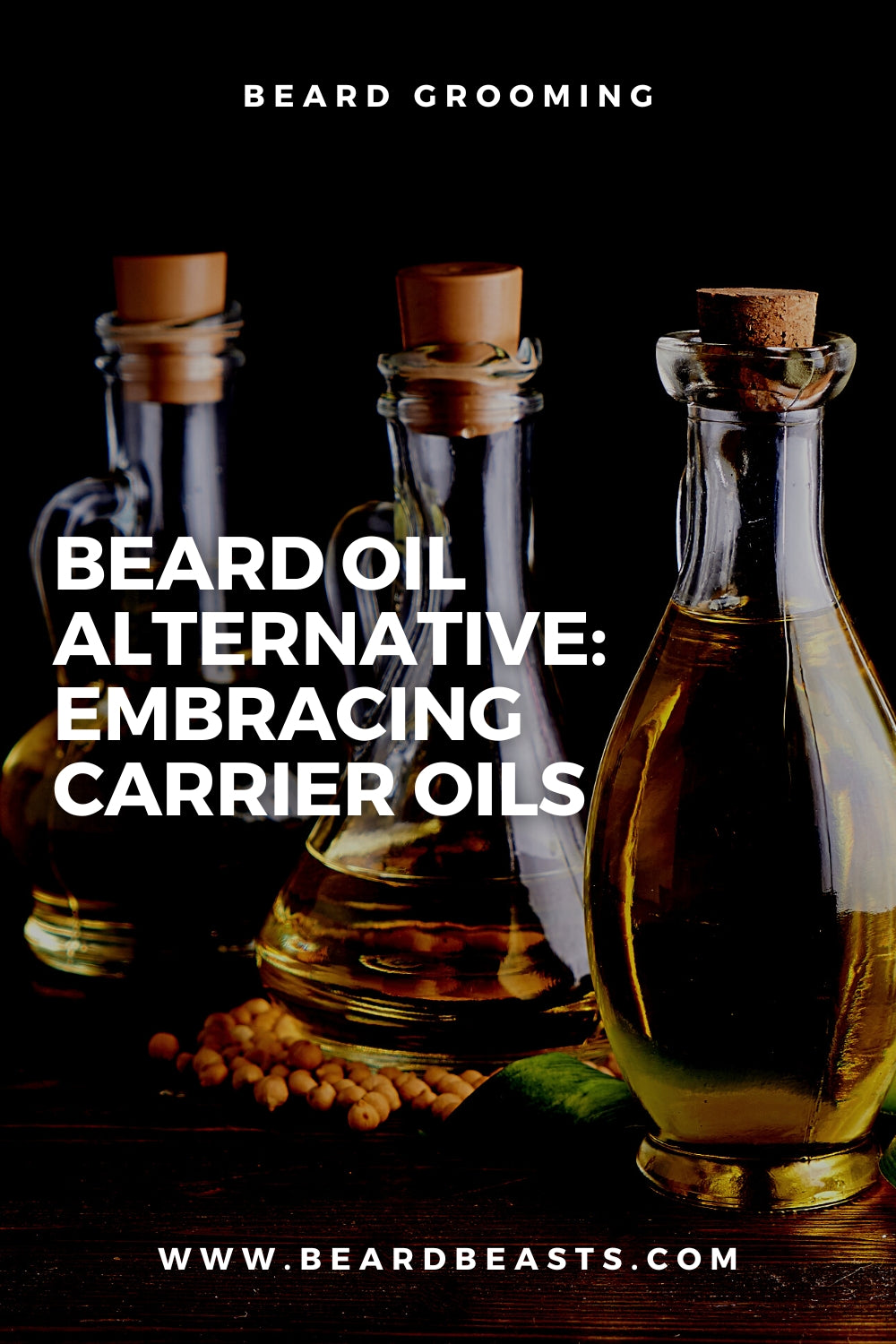Beard Oil Alternative
In the quest for a natural beard oil alternative, many have turned to carrier oils, reshaping the landscape of beard grooming. These plant-derived oils are not just an alternative for beard oil, but a preferred choice for those seeking a blend of potency and wholesomeness, challenging traditional beard oils. This trend's growth begs the question: what makes carrier oils a popular beard oil substitute?
Navigating the world of beard care products can be daunting, but carrier oils emerge as a standout for their natural simplicity and effectiveness. As a beard oil substitute, these oils, sourced from seeds, nuts, and kernels, offer essential nutrients for maintaining beard health, aligning closely with nature's offerings. The shift towards carrier oils is more than a trend; it's a growing preference for purity and straightforwardness in grooming products.
Carrier oils provide more than just an alternative for beard oil; they reflect the modern man's evolving grooming preferences. From moisturizing dry skin to managing unruly beard hair, each carrier oil, like the balancing jojoba or nourishing argan, brings unique benefits. This exploration of carrier oils in beard care is not just about finding another beard maintenance option; it's about embracing a natural, healthier approach to grooming, marking a shift towards authenticity and simplicity in beard care.
What Are Carrier Oils?
In our journey towards understanding the allure of carrier oils as a beard oil alternative, it's essential to first grasp what these oils are and how they differentiate from other products in beard care. Carrier oils are more than just a substitute for traditional beard oils; they are a cornerstone in the natural grooming world.
The Essence of Carrier Oils
Carrier oils are naturally derived from the fatty portions of plants, like seeds, kernels, and nuts. These oils are prized for their gentle, nourishing properties. Unlike essential oils, which are highly concentrated and often used for their fragrance and therapeutic qualities, carrier oils are milder and have a subtler scent. This makes them an excellent base for diluting essential oils, reducing the potential for skin irritation.
Key Characteristics of Carrier Oils
What makes carrier oils a sought-after alternative for beard oil? Their composition is a good place to start. Rich in vitamins, essential fatty acids, and antioxidants, carrier oils provide deep nourishment to both the beard and underlying skin. This ability to moisturize and soothe makes them particularly appealing for those with sensitive skin or for anyone seeking a more natural approach to beard care.
In essence, carrier oils represent a shift towards a more natural, skin-friendly approach to beard grooming. By opting for a carrier oil as your beard oil substitute, you're choosing a product that respects the natural balance of your skin and beard, offering a blend of simplicity, effectiveness, and gentleness.
Benefits of Carrier Oils for Beard Health
As we explore the realm of natural beard grooming, the benefits of carrier oils - a superb beard oil alternative - become increasingly clear. These oils are not just an alternative for beard oil; they are a transformative element in maintaining beard health. Let's delve into the nourishing properties of carrier oils and how they cater to different beard types and lengths.
Nourishing Properties of Carrier Oils
Carrier oils are laden with natural nutrients that are essential for a healthy beard. These include:
- Vitamins: Many carrier oils are rich in vitamins like Vitamin E, which is known for its antioxidant properties. This helps in protecting the beard and skin from environmental stressors.
- Fatty Acids: Essential fatty acids in carrier oils, such as omega-3 and omega-6, are crucial for strengthening hair follicles and promoting healthier beard growth.
- Natural Moisturizers: Carrier oils naturally moisturize the beard and the skin underneath. This is particularly beneficial for preventing beard dandruff and itchiness.
By incorporating a beard oil substitute like jojoba, argan, or sweet almond oil into your grooming routine, you're providing your beard with a wealth of natural goodness that many traditional beard oils may lack.
Skin Benefits
The advantages of carrier oils extend beyond the beard itself to the skin underneath. These oils can help to:
- Soothe Skin Irritation: Carrier oils are known for their soothing properties, making them ideal for those with sensitive skin or skin conditions like eczema.
- Balance Oil Production: Oils like jojoba oil closely mimic the skin's natural sebum, helping to balance oil production and prevent excessive dryness or oiliness.
- Improve Skin Health: Regular use of carrier oils can improve the overall health of the skin beneath the beard, leading to a healthier, more comfortable beard growing environment.
In summary, carrier oils offer a holistic approach to beard care. They’re not just a beard oil substitute; they are a pathway to a healthier, more nourished beard, irrespective of its type or length. Embracing carrier oils as an alternative for beard oil means choosing a route that cares for both your beard and the skin beneath it, ensuring overall beard health and vitality.
Top Carrier Oils as Beard Oil Alternatives
In the quest for the perfect beard oil alternative, certain carrier oils stand out for their unique properties and benefits. Each oil offers distinct advantages, making them ideal substitutes for traditional beard oils. Let's explore some of the top carrier oils that can revolutionize your beard care routine.
Argan Oil: A Nutrient Powerhouse
Argan oil, often referred to as 'liquid gold,' is a top contender as a beard oil substitute. It's packed with nutrients like Vitamin E and fatty acids, which are essential for maintaining beard health. This oil is remarkably non-greasy, absorbing quickly into the beard and skin, making it perfect for daily use. Its hydrating properties keep the beard soft and manageable, while also nurturing the skin underneath.
Jojoba Oil: Mimicking Natural Skin Oils
Jojoba oil is unique because its chemical structure closely resembles the sebum naturally produced by our skin. This makes it an ideal choice for those with sensitive skin or for anyone looking for a beard oil alternative that harmoniously blends with the body's natural oils. Jojoba oil is excellent for overall beard health, providing moisture without clogging pores, making it a go-to option for maintaining a healthy, itch-free beard.
Sweet Almond Oil: Vitamin-Rich Beard Growth Promoter
Sweet almond oil is another fantastic beard oil substitute, especially for those looking to encourage beard growth. High in vitamins A, E, and B, this oil not only nourishes the beard but also stimulates hair follicles, promoting healthier, fuller growth. Its lightweight nature makes it suitable for regular use, and it's particularly beneficial for those with a dry beard.
Coconut Oil: Hydrating and Shine-Enhancing
Coconut oil has long been praised for its moisturizing properties. As a beard oil alternative, it's excellent for adding hydration and a natural shine to your beard. It helps in taming frizz and makes the beard appear fuller and more lustrous. However, it's a bit heavier than other oils, so a little goes a long way, especially for those with finer beard hair.
Grapeseed Oil: Perfect for Oily Skin Types
If you have oily skin or a beard that tends to get greasy, grapeseed oil is an ideal beard oil substitute. It's lightweight, non-greasy, and has astringent properties, making it perfect for controlling excess oil production. Grapeseed oil is also rich in linoleic acid, which helps in improving skin health and reducing beard dandruff.
In conclusion, these carrier oils offer a range of benefits as alternatives to traditional beard oils. Whether you’re looking for an oil that promotes growth, adds shine, or balances your skin's natural oils, there’s a carrier oil that can meet your needs. Integrating these natural, nourishing oils into your beard care routine can lead to a healthier, more attractive beard, showcasing the versatility and effectiveness of these natural alternatives.
How to Use Carrier Oils in Your Beard Care Routine
Incorporating carrier oils as a beard oil alternative into your grooming routine can significantly enhance the health and appearance of your beard. But how do you use these oils effectively? Here are some practical guidelines on application, quantity, and mixing with essential oils for added benefits.
Guidelines on Application and Quantity
-
Start with a Small Amount: The key is to use just enough oil to coat the beard without making it greasy. A few drops are usually sufficient, especially when starting with lighter oils like argan or jojoba.
-
Warm the Oil: Before application, warm the oil by rubbing it between your palms. This helps in spreading the oil evenly and enhances absorption.
-
Apply to a Damp Beard: Applying carrier oil to a damp beard (post-shower is ideal) helps lock in moisture and evenly distributes the oil.
-
Massage into the Beard and Skin: Don't just apply to the hair; gently massage the oil into your skin as well. This helps in nourishing the skin beneath and promotes healthy hair growth.
-
Comb Through for Even Distribution: After applying the oil, use a beard comb to evenly distribute it throughout your beard.
Mixing Carrier Oils with Essential Oils for Added Benefits
To boost the benefits of carrier oils, consider blending them with essential oils. Here’s how to do it:
-
Choose Complementary Essential Oils: Depending on your needs (like relaxation, fragrance, or skin benefits), pick essential oils that complement your carrier oil. For example, lavender for relaxation or tea tree oil for its antibacterial properties.
-
Proper Ratios are Key: A general guideline is to mix 1-2 drops of essential oil per teaspoon of carrier oil. This ensures that the essential oil's potency is balanced by the soothing nature of the carrier oil.
-
Test for Sensitivities: Before applying a new blend to your beard, do a patch test on a small skin area to ensure there's no adverse reaction.
-
Customize Your Blend: Feel free to experiment with different combinations of carrier and essential oils to find the blend that works best for you. Remember, what works for one person’s beard may not work for another.
Using carrier oils as a beard oil substitute or in conjunction with essential oils can provide a personalized beard care experience. By following these guidelines, you can leverage the natural benefits of these oils, leading to a healthier, more vibrant beard. Whether you're using them as a stand-alone beard oil alternative or as a part of a more elaborate grooming regimen, carrier oils offer a versatile, effective solution for your beard care needs.
Comparing Carrier Oils with Traditional Beard Oils
When it comes to beard care, the choice between carrier oils and traditional beard oils can be crucial. Both have their merits, but understanding the differences in terms of effectiveness, cost, and skin compatibility can help determine why carrier oils might be a more suitable option for some users. Let's break down these aspects to see how a beard oil alternative like carrier oils stacks up against traditional beard oils.
Effectiveness: Nourishment and Conditioning
- Carrier Oils: These oils are renowned for their natural ability to nourish and condition the beard and skin. Since they're extracted from natural sources, they're rich in vitamins and fatty acids, essential for beard health. They're particularly effective for users who prefer a minimalist, natural approach to beard care.
- Traditional Beard Oils: Often a blend of various ingredients, including carrier and essential oils, traditional beard oils are designed to provide specific benefits like fragrance, hydration, and conditioning. They might offer more in terms of scent variety but some do contain synthetic additives which we encourage you to avoid. Our classic beard oil is a perfect blend of natural carrier oils with added essential oils for scent, and Vitamin E.
Cost: Affordability and Value
- Carrier Oils: Generally, carrier oils are more cost-effective, especially if you're looking for a straightforward, no-frills beard oil substitute. They can be purchased in larger quantities and have a longer shelf life, providing better long-term value.
- Traditional Beard Oils: These can vary widely in price, often influenced by branding, packaging, and the complexity of their formulations. While they offer more specialized options, they might not always provide the best value, especially for those who appreciate simplicity in their grooming products.
Skin Compatibility: Sensitivity and Reaction
- Carrier Oils: One of the biggest advantages of carrier oils is their skin compatibility. They are less likely to cause irritation, making them a great choice for those with sensitive skin or skin conditions. The natural properties of these oils ensure they work harmoniously with your skin's natural oils.
- Traditional Beard Oils: While many traditional beard oils like our own are formulated to be skin-friendly, the presence of fragrances or additives can sometimes lead to skin irritation or allergies. Users with sensitive skin might need to be more cautious and selective with these products.
Why Carrier Oils Might Be a Better Option
Carrier oils offer a natural, effective, and gentle alternative for beard oil, making them a compelling choice for many. They are particularly beneficial for those who:
- Prefer all-natural grooming products.
- Have sensitive skin or are prone to allergies.
- Are looking for a cost-effective solution to beard care.
- Value simplicity and minimalism in their grooming routine.
In conclusion, while traditional beard oils have their place in the grooming world, carrier oils stand out for their natural composition, skin-friendliness, and value. They embody a simpler, more straightforward approach to beard care, appealing to users who prioritize natural ingredients and simplicity in their grooming regimen.
FAQs on Using Carrier Oils As A Beard Oil Alternative
Incorporating a beard oil alternative like carrier oils into your grooming routine can raise some questions. Here, we address two common FAQs to help you better understand the use of carrier oils as an alternative for beard oil and ensure a satisfying beard care experience.
Can carrier oils alone provide enough nourishment and hold for my beard?
Answer: Absolutely! Carrier oils are excellent for nourishing and conditioning the beard. They penetrate deep into the hair follicles and skin, providing essential nutrients and hydration. However, in terms of hold and styling, they offer a more natural, less rigid hold compared to some traditional beard oils or balms. If you prefer a more sculpted look, you might want to complement the carrier oil with a natural beard wax or balm. But for daily nourishment and a natural look, carrier oils are an ideal beard oil substitute.
How do I choose the right carrier oil for my beard type and skin?
Answer: Selecting the right carrier oil depends on your beard type and skin sensitivity. Here’s a quick guide:
- For Oily Skin: Grapeseed oil is light and can help regulate natural oil production.
- For Dry or Itchy Skin: Argan or coconut oil can provide deep hydration and soothe the skin.
- For Sensitive Skin: Jojoba oil is great as it closely mimics the skin's natural oils, reducing the chance of irritation.
- For Beard Growth: Sweet almond oil is rich in vitamins and can promote healthier beard growth.
Remember, it's about personal preference and observing how your beard and skin respond to different oils. You can always experiment with a few to find your perfect match.
By answering these FAQs, we hope to clarify some of the common concerns regarding the use of carrier oils in beard maintenance. As a natural and effective beard oil alternative, carrier oils offer a customizable, skin-friendly approach to beard care, catering to a variety of needs and preferences.

Conclusion: Embracing Natural Beard Oil Alternative
As we reach the end of our exploration into carrier oils as a beard oil alternative, it's clear that these natural wonders offer more than just a substitute for traditional beard oils. They represent a shift towards a more organic, skin-friendly approach in beard maintenance. Let's recap the benefits and encourage a journey towards finding your ideal beard care solution.
The Natural Edge of Carrier Oils
Switching to carrier oils for beard care isn't just a trend; it's a conscious choice towards embracing nature's gifts. These oils bring a plethora of benefits:
- Nourishment and Hydration: Rich in essential vitamins and fatty acids, carrier oils provide deep nourishment, keeping your beard healthy and vibrant.
- Skin Compatibility: Being natural and less processed, they are gentler on the skin, making them a great choice for those with sensitive skin or who prefer a more natural grooming routine.
- Cost-Effective and Pure: With no added synthetic ingredients, carrier oils offer a pure, more affordable alternative for beard oil, delivering excellent value for money.
- Versatility: Whether you have a short, neat beard or a long, flowing one, there's a carrier oil that can cater to your specific needs.
Your Beard, Your Choice
The journey to finding the perfect beard care solution is deeply personal. What works for one, might not for another. That's the beauty of carrier oils – they offer the flexibility to experiment and discover what truly works for you. Whether you choose argan oil for its non-greasy nourishment or jojoba oil for its skin-balancing properties, the key is to listen to your beard and skin.
We encourage you to step into this natural realm of beard care. Explore the various carrier oils, blend them with your favorite essential oils if you like, and find the combination that resonates with your beard and skin the most. Remember, the best beard care routine is the one that is tailored to you.
In embracing carrier oils as a beard oil substitute, you're not just caring for your beard; you're nurturing it with the simplest, most effective ingredients nature has to offer. So go ahead, make the switch, and enjoy the journey to a healthier, happier beard.





